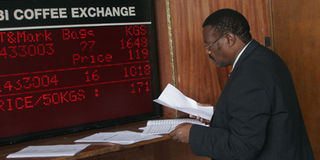Watchdog to probe key players in agriculture sector

Mr Ben Nyamombo goes through documents at the Nairobi Coffee Exchange during a standoff between famers and the Kenya Planters Cooperative Union in Nairobi on February 9, 2009. Dominant players in the agriculture sector face deeper scrutiny as the Competition Authority of Kenya looks into possible uncompetitive behaviour in the sector, with the Authority looking into allegations that cartels are infiltrating the coffee and tea sub-sectors. PHOTO/PETERSON GITHAIGA
What you need to know:
Agriculture, banking and manufacturing among those targeted as Authority moves to level playing field
Dominant players in the agriculture sector face deeper scrutiny as the Competition Authority of Kenya looks into possible uncompetitive behaviour in the sector.
The Authority last week said it was carrying out investigations into allegations that cartels are infiltrating the coffee and tea sub-sectors.
Accusing the multinationals that dominate the Nairobi Coffee Exchange of manipulation and under-pricing, five coffee growing counties — Nyeri, Kiambu, Murang’a, Kirinyaga and Meru — earlier this year said they would boycott the current model in favour of jointly marketing their produce.
The CAK has now said it will begin investigations into the alleged cartels in the coffee sector to “get the evidence and prosecute whoever is involved.”
In addition, the Authority wrote letters warning counties against implementing new coffee-selling models that would be equally detrimental to competition in the sector.
“We are not conclusive that the governors’ solution is wrong, but we want solutions that support competition,” said CAK director- general Wang’ombe Kariuki at a media training forum on Friday.
TEA SECTOR REPORT
Nyeri Governor Nderitu Gachagua had earlier this year issued a directive that all coffee produced in the county would be processed at the Sagana Coffee Mill, denying farmers wishing to take their coffee elsewhere movement permits.
The Authority is preparing a report on the tea sector that will, in part, address allegations of price collusion among buyers and brokers in the tea sector.
“There have been reports about the Mombasa tea auction in regard to the mode of marketing, with allegations that cartels collude to manipulate prices. We are probing that,” said Mr Kariuki.
The Authority will also carry out inquiries into the conduct of players in the seeds market, where there is evidence of market concentration and exclusive arrangements between researchers and distributors that may not be conducive to competition.
CEMENT SECTOR
However, addressing matters of competition in the agriculture sector will also require introspection on the government’s part, Mr Kariuki notes, as market concentration and uncompetitive behaviour in some sub-sectors, such as pyrethrum, have been facilitated by legislation.
Further, some sector watchdogs, the director-general said, are introducing regulations that may favour one dominant player.
A recent report by the African Competition Forum on competition in the sugar sectors of Kenya, Tanzania, South Africa and Zambia says competitiveness of the local industry has been hindered largely by state policy.
Beyond agriculture, the Authority is also looking at the conduct of players in the cement sector. A report by ACF last month raised concerns about French firm Lafarge’s cross-directorship in East African Portland Cement Company and Bamburi Cement.
“The fact that Lafarge has a stake in EAPCC, which allows it to appoint two board members, is a concern because then the company has access to their strategy which it may use in its favour,” read the report.
In banking, CAK is assessing whether the high interest-rate spreads are rooted in price collusion.





